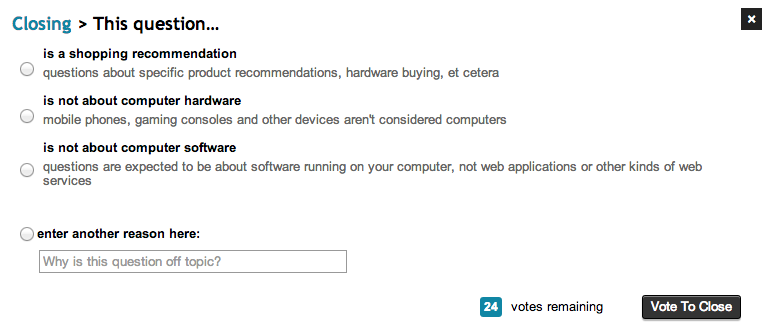Goals for "Off-Topic"
We'll be asking for your help on a number of closing issues, but this post is focused on how we can improve "Off-Topic" closures.
Don't worry, we plan to keep on closing, but want to identify improvements that optimize for:
- clarity- we want to make it as clear as possible to the OP exactly what makes their post off-topic to minimize frustration and reduce the misperception that they’re just being “picked on for being a noob”
- improvement - we want the language and workflow to encourage editing wherever possible (and in particular, to make improving a post seem more logical than arguing that it shouldn’t have been closed.)
- accessibility - we need to convey that information with as little dependence on other sources (FAQ, etc.) as possible
Is this even necessary? What's actually not working today?
To be clear, closing questions as Off-Topic, exactly as implemented today, is doing a hell of a lot of good. Big picture, it's a huge success, and one of the key things separating us from Whoopie! Responses.
And we're mostly doing a good job closing the right questions as off-topic. But...
We can do a much better job helping posters to understand why their question is off-topic.
Consider a question like this one, from our programmers site: How do I review my own code?. Now, to be fair, this particular question wasn't asked on SO first, but we've all seen ones like it asked there.
Put yourself in the shoes of the poor fellow who might happen to ask that question on SO. It's promptly closed (as it should be), but here's the message you get back:
Questions on Stack Overflow are expected to relate to programming or software development within the scope defined in the FAQ.
Hmm... how is a question about code review not related to programming or software development? The message doesn't just fail to make the user understand their mistake, it actually makes them more frustrated, as it reinforces their perception that it meets the criteria.
But wait a second. Is it really so unreasonable to expect them to ignore or get over that conflict, and go read the FAQ - there’s a link right there? That's a question for another day, but let’s say they actually do that. It’s still hard. The first thing you see on the FAQ is the list of questions that you should ask here. Guess what’s on it?
if your question generally covers …practical, answerable problems that are unique to the programming profession… then you’re in the right place to ask your question!
“How do I review my own code” still seems to meet the criteria.
And if you soldier on, you'll find the two additional relevant sections in the FAQ (that are initially hidden) which you might think would help - one is on what NOT to ask, and another is on question types that probably belong on another site, but neither of them actually eliminate this question.
So, imagine you’re this user. You post a question that sure seems to be about programming, but it’s closed because this site only accepts questions that “relate to programming or software development.” You get over this seeming inconsistency, go to the FAQ, where you find another indication that your question belongs here, and no indications that it doesn’t.
Now, we can improve the FAQ to cover this, and we are planning a number of FAQ enhancements, but that’s more like treating the symptom than designing a cure, and it's dependent on getting them to go somewhere new to learn more about what they did wrong.
So, the question is this:
Without lowering our standards, how can we make the system convey what specifically made a closed question off-topic, with as little navigation as possible?
If we can answer that, people still may not like having their questions closed, but they'll be less likely to incorrectly assume they're "just being picked on" or make the same mistake again, and some may even be able to edit their question to fix the problem.
Part of the close reason rework project:


